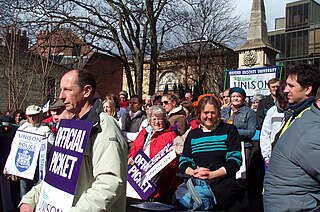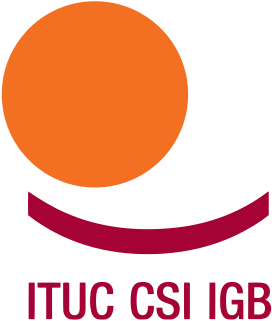Related Research Articles

The politics of the Federated States of Micronesia (FSM) takes place in a framework of a federal assembly-independent representative democratic republic. The President of the Federated States of Micronesia is both head of state and head of government. Executive power is exercised by the president and his cabinet, while legislative power is vested in both the president and the Congress. The judiciary is independent of the executive and the legislature.
A trade union, often simply called a union, is an organization of workers who have come together to achieve many common goals, such as protecting the integrity of their trade, improving safety standards, and attaining better wages, benefits, and working conditions through the increased bargaining power wielded by the creation of a monopoly of the workers. Trade unions typically fund the formal organization, head office, and legal team functions of the trade union through regular fees or union dues. The delegate staff of the trade union representation in the workforce are made up of workplace volunteers who are appointed by members in democratic elections.

The foreign relations of Laos, internationally designated by its official name as the Lao People's Democratic Republic, after the takeover by the Pathet Lao in December 1975, were characterized by a hostile posture toward the West, with the government of the Lao People's Democratic Republic aligning itself with the Soviet bloc, maintaining close ties with the Soviet Union and depending heavily on the Soviets for most of its foreign assistance. Laos also maintained a "special relationship" with Vietnam and formalized a 1977 treaty of friendship and cooperation that created tensions with China.
Labour law mediates the relationship between workers, employing entities, trade unions and the government. Collective labour law relates to the tripartite relationship between employee, employer and union. Individual labour law concerns employees' rights at work also through the contract for work. Employment standards are social norms for the minimum socially acceptable conditions under which employees or contractors are allowed to work. Government agencies enforce labour law.
In British politics, an affiliated trade union is one that is linked to the Labour Party. The party was created by the trade unions and socialist societies in 1900 as the Labour Representation Committee and the unions have retained close institutional links with it.
A national trade union center is a federation or confederation of trade unions in a single country. Nearly every country in the world has a national trade union center, and many have more than one. When there is more than one national center, it is often because of ideological differences—in some cases long-standing historic differences. In some regions, such as the Nordic countries, different centers exist on a sectoral basis, for example for blue collar workers and professionals.

The Bharatiya Mazdoor Sangh is one of the trade union organization in India. It was founded by Dattopant Thengadi on 23 July 1955.
A labour council, trades council or industrial council is an association of labour unions or union branches in a given area. Most commonly, they represent unions in a given geographical area, whether at the district, city, region, or provincial or state level. They may also be based on a particular industry rather than geographical area, as for example, in the Maritime Council of Australia which co-ordinated the waterfront and maritime unions involved in the 1890 Australian Maritime Dispute.

Trade unions in the United Kingdom were first decriminalised under the recommendation of a Royal Commission in 1867, which agreed that the establishment of the organisations was to the advantage of both employers and employees. Legalised in 1871, the Trade Union Movement sought to reform socio-economic conditions for working men in British industries, and the trade unions' search for this led to the creation of a Labour Representation Committee which effectively formed the basis for today's Labour Party, which still has extensive links with the Trade Union Movement in Britain. Margaret Thatcher's governments weakened the powers of the unions in the 1980s, in particular by making it more difficult to strike legally, and some within the British trades union movement criticised Tony Blair's Labour government for not reversing some of Thatcher's changes. Most British unions are members of the TUC, the Trades Union Congress, or where appropriate, the Scottish Trades Union Congress or the Irish Congress of Trade Unions, which are the country's principal national trade union centres.
The Liberal–Labour movement refers to the practice of local Liberal associations accepting and supporting candidates who were financially maintained by trade unions. These candidates stood for the British Parliament with the aim of representing the working classes, while remaining supportive of the Liberal Party in general.

The International Centre for Trade Union Rights (ICTUR) is "an organizing and campaigning body with the fundamental purpose of defending and improving the rights of trade unions and trade unionists throughout the world." ICTUR has accredited status with both the United Nations and the International Labour Organization.
Trade unions in South Africa have a history dating back to the 1880s. From the beginning unions could be viewed as a reflection of the racial disunity of the country, with the earliest unions being predominantly for white workers. Through the turbulent years of 1948–1991 trade unions played an important part in developing political and economic resistance, and eventually were one of the driving forces in realising the transition to an inclusive democratic government.

The International Trade Union Confederation is the world's largest trade union federation. It was formed on 1 November 2006 out of the merger of the International Confederation of Free Trade Unions (ICFTU) and the World Confederation of Labour (WCL). The Founding Congress of the ITUC was held in Vienna and was preceded by the dissolution congresses of both the ICFTU and the WCL. The ITUC has three main regional organizations: the Asia-Pacific Regional Organization, the American Regional Organization, and the African Regional Organization. The Trade Union Development Cooperation Network (TUDCN) is an initiative of the ITUC whose main objective is to bring the trade union perspective into international development policy debates and improve the coordination and effectiveness of trade union development cooperation activities.
The Trade Union and Labour Party Liaison Organisation (TULO) is a labour organisation in the United Kingdom that was set up in 1994 by a motion to the Labour Party's Annual Conference. It had several forerunning organisations that coordinated trade union support for the Labour Party at election times such as Trade Unions for a Labour Victory and Trade Unionists For Labour. TULO is different in that, as a more formal organisation, it serves the dual purposes of not only coordinating trade union support for the Labour Party at elections, but also of acting as the channel of communication between the Party Leadership and its affiliated trade unions.
The Labour Party is a centre-left political party in the United Kingdom that has been described as an alliance of social democrats, democratic socialists and trade unionists. In all general elections since 1922, Labour has been either the governing party or the Official Opposition. There have been six Labour prime ministers and thirteen Labour ministries.
Japanese settlement in what constitutes the present-day Federated States of Micronesia (FSM) dates back to the end of the 19th century, when Japanese traders and explorers settled on the central and eastern Carolines, although earlier contacts can not be completely excluded. After Japan occupied the islands in 1914, Japanese migrated to the Carolines on a large scale in the 1920s and 1930s. The Japanese government encouraged immigration to the islands belonging to the South Seas Mandate in order to offset demographic and economic problems facing Japan at that time.

The Trades Union Congress (TUC) is a national trade union centre, a federation of trade unions in England and Wales, representing the majority of trade unions. There are 48 affiliated unions, with a total of about 5.5 million members. The current General Secretary is Frances O'Grady.
The labour movement or labor movement consists of two main wings: the trade union movement or labor union movement, also called trade unionism or labor unionism on the one hand, and the political labour movement on the other.
References
- ICTUR; et al., eds. (2005). Trade Unions of the World (6th ed.). London, UK: John Harper Publishing. ISBN 0-9543811-5-7.
| This article related to an Oceanian trade union is a stub. You can help Wikipedia by expanding it. |
| This Federated States of Micronesia article is a stub. You can help Wikipedia by expanding it. |